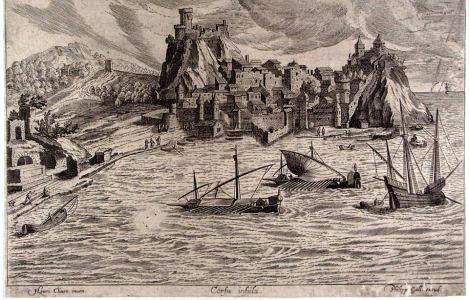
The house of the history of Corfu has been directly connected with its geographical position.As a crossroads between east and wes, it has seen the passage of numerous conquerors across its soil. The seems to have been first inhabited in the Paleolithic period (30,000 – 7,000 BC), as evidenced by finds that came to light in the Grava cave at Gardiki in the south west of Corfu. The Plaeokastritsa area has yielded finds date form the Late Paleolithic and Mesolithic periods, and the sites of various Neolithic settlements have been discovered, the most important of which is at Sidari on the north coast (6000-2600 BC). The Neolithic civilization of Corfu, and the Bronze Age culture which followed it (3000-1100 BC), have much more in common with prehistoric cultures of Apulia in southern Italy that they do with the culture of mainland Greece, and there are traces of influence from other parts of the Balkans.
The first settlement of Greeks on Corfu of which we can be sure took place around 760-750 BC, and the expedition set out from the city of Eretria in Euboea. Next followed: THE ROMAN PERIOD (229 BC – 395 AD), THE BYZANTINE PERIOS (395 – 1267) the first period of Venetian rule (1207-1214), THE ANGEVINS (1267-1386), THE SECOND PERIOD OF VENETIAN RULE (1386 - 1797),THE FIRST PERIOD OF FRENCH RULE (1797 – 1799), THE RUSSO – TURKISH OCCUPATION THE SEPTINSULAR STATE (1799 – 1807), SECOND PERIOD OF FRECH RULE (1807 – 1814), THE BRITISH PROTECTORATE (1816 – 1964) … and in the end on 21 May of 1864 after many years of efforts the Ionian islands were incorporated in to the Greek state.

However, Britain did not make this concession without taking political considerations into account.: it was Britain which insisted that a Danish prince whom it trusted to installed, at the same time, as King George I of Greece.After the treaty of unification was signed, the Ionian islands were compelled to demolish all their fortifications, while Corfu and Paxoi were declared neutral territory.However, the neutrality of Corfu proved on a number of occasions to be something of a formality. During the First World War, Entente forces landed Serbian and French troops on the island, and in early 1916 the Serbian government – in – exile established itself there. A year later, Serbian Prime Minister Pasic and South Slav representative Trubic signed what was known as the "Corfu declaration" which laid the foundations for the formation of Yugoslavia by the Serbs, the Croats and the Slovenians.
Corfu's neutrality was violated once more in 1923, when the Italian holding Greece responsible for the assassination of the Italian general Tallini, bombed the island and occupied it. The Italian bombed Corfu once again when the Second World War broke out, and later, in 1943 it was raided mercilessly by the Germans, who occupied it and remained in control of it until the end of the War in 1945